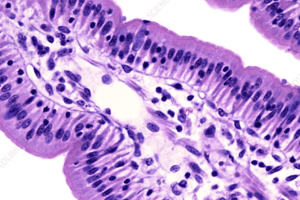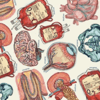Podcast
Questions and Answers
What is a symptom of diverticulitis?
What is a symptom of diverticulitis?
- Frequent bowel movements
- Pain, bloating, and vomiting (correct)
- Difficulty passing hardened stools
- Steatorrhea and bulging abdomen
What is the main cause of celiac disease?
What is the main cause of celiac disease?
- Lack of fruits and vegetables in the diet
- Insufficient water intake
- Overconsumption of dairy products
- Immune-mediated response to gluten (correct)
How is celiac disease diagnosed?
How is celiac disease diagnosed?
- IgA antigliadin antibodies (correct)
- Endoscopy
- Oral glucose tolerance test
- Biopsy of the liver
What is a common sign of constipation in children?
What is a common sign of constipation in children?
How can a child's stool be softened?
How can a child's stool be softened?
What is a common treatment for constipation in children?
What is a common treatment for constipation in children?
What is the most common way H. pylori is transmitted in adolescents?
What is the most common way H. pylori is transmitted in adolescents?
What is the primary treatment for H. pylori infection?
What is the primary treatment for H. pylori infection?
What is the primary symptom of Hepatitis A?
What is the primary symptom of Hepatitis A?
What is the primary way to prevent transmission of Hepatitis B?
What is the primary way to prevent transmission of Hepatitis B?
What is the primary symptom of Hepatitis C?
What is the primary symptom of Hepatitis C?
What is the primary way to prevent transmission of Hepatitis A?
What is the primary way to prevent transmission of Hepatitis A?
What is the recommended amount of milk for a 1-year-old child per meal?
What is the recommended amount of milk for a 1-year-old child per meal?
What is the purpose of drinking milk with prebiotics?
What is the purpose of drinking milk with prebiotics?
What is the recommended duration for a child to sit on the toilet after meals or before bed?
What is the recommended duration for a child to sit on the toilet after meals or before bed?
What is a common symptom of Inguinal Hernia in boys?
What is a common symptom of Inguinal Hernia in boys?
Which disease is characterized by the absence of ganglionic innervation to a section of the bowel?
Which disease is characterized by the absence of ganglionic innervation to a section of the bowel?
'Moon face' and 'sparse hair' are associated with which form of malnutrition?
'Moon face' and 'sparse hair' are associated with which form of malnutrition?
'Flag sign in the hair' is a characteristic of which condition?
'Flag sign in the hair' is a characteristic of which condition?
'Liver disease,' 'Eye pain,' and 'Anemia' are symptoms associated with which condition?
'Liver disease,' 'Eye pain,' and 'Anemia' are symptoms associated with which condition?
What is the main role of prebiotics in milk consumption?
What is the main role of prebiotics in milk consumption?
What percentage of total body weight is accounted for by body water in adults?
What percentage of total body weight is accounted for by body water in adults?
What is the average percentage of total body weight accounted for by body water in children?
What is the average percentage of total body weight accounted for by body water in children?
What is the most common cause of vomiting in children?
What is the most common cause of vomiting in children?
What is the recommended initial management for a child with vomiting?
What is the recommended initial management for a child with vomiting?
What is the most common cause of chronic (long-term) diarrhea in children?
What is the most common cause of chronic (long-term) diarrhea in children?
Which of the following is not a common bacterial pathogen that can cause diarrhea in children?
Which of the following is not a common bacterial pathogen that can cause diarrhea in children?
What is the recommended initial management for a child with mild diarrhea?
What is the recommended initial management for a child with mild diarrhea?
What is the most common sign of severe dehydration in a child with diarrhea?
What is the most common sign of severe dehydration in a child with diarrhea?
What is the recommended initial management for a child with severe diarrhea?
What is the recommended initial management for a child with severe diarrhea?
What laboratory finding is expected in a child with severe diarrhea?
What laboratory finding is expected in a child with severe diarrhea?
What is the main function of the gastrointestinal tract?
What is the main function of the gastrointestinal tract?
Which of the following is NOT part of the upper gastrointestinal tract?
Which of the following is NOT part of the upper gastrointestinal tract?
What can happen if a gastrointestinal disorder is not adequately treated?
What can happen if a gastrointestinal disorder is not adequately treated?
Why is health education important for children with gastrointestinal disorders and their families?
Why is health education important for children with gastrointestinal disorders and their families?
Which of the following is NOT a type of feeding tube mentioned in the text?
Which of the following is NOT a type of feeding tube mentioned in the text?
Why is retaining fluid of greater importance in infants compared to adults?
Why is retaining fluid of greater importance in infants compared to adults?
Flashcards are hidden until you start studying
Study Notes
Gastrointestinal Disorders
- Diverticulitis: swelling of the intestinal wall, causing pain, bloating, diarrhea, constipation, and vomiting.
Celiac Disease
- Abnormal immune response to gluten in wheat, rye, oats, and barley, causing malabsorption of nutrients.
- Symptoms: steatorrhea (bulky, foul-smelling, fatty stools), malnutrition, distended abdomen, and deficiencies in fat-soluble vitamins A, D, K, and E.
- Diagnostics: IgA antigliadin antibodies, endoscopy, biopsy, and oral glucose tolerance test.
- Treatment: gluten-free diet, including fruits, veggies, chicken, salmon, tuna, beef, cheese, plain yogurt, milk, nuts, seeds, herbs, and spices.
Constipation
- Difficulty passing hardened stools, affecting children of any age.
- Causes: diet, illness, travel, hot weather, withholding stool, and stress.
- Symptoms: soiling underwear, hard or painful stools, many days between bowel movements, stomachaches, cramping, and nausea.
- Treatment: softening stool with orange or prune juice, adequate water intake, fiber-rich foods, and milk.
H. pylori Infection
- Bacterial infection causing ulcers in the stomach and small intestine.
- Symptoms: burning in the upper abdomen, bloating, heartburn, nausea, vomiting, dark stools, and unexplained weight loss.
- Treatment: antibiotic therapy, proton pump inhibitors, and prevention of re-infection.
Hepatic Disorders
- Hepatitis A, B, and C: viral infections causing fever, dark urine, pale stools, nausea, vomiting, and jaundice.
- Symptoms: digestive disorders, diarrhea, joint pain, weakness, fatigue, headache, and sleep disruption.
- Treatment: vaccination, immunization, and strict handwashing and infection control.
Inguinal Hernia
- Protrusion of the bowel into the inguinal ring, more common in boys.
- Symptoms: tension, soreness, delayed feces, gas, hiccups, vomiting, and urinary disorders.
- Treatment: herniotomy or herniorrhaphy.
Hirschsprung's Disease
- Aganglionic megacolon: absence of ganglionic innervation, causing chronic constipation and ribbon-like stools.
- Symptoms: abdominal pain, vomiting, constipation, and bowel obstruction.
- Treatment: surgical removal of the affected bowel segment.
Inflammatory Bowel Disease
- Autoimmune disorder causing ulcers in the colon and rectum.
- Symptoms: fever, fatigue, stomach pain, vomiting, weight loss, diarrhea, and rectal bleeding.
- Treatment: anti-inflammatory drugs, antibiotics, anti-diarrheal medications, pain relievers, vitamins, and supplements.
Disorders Caused by Food, Vitamin, and Mineral Deficiency
- Kwashiorkor: edematous malnutrition due to protein deficiency, causing hair loss, anemia, and swollen abdomen.
- Marasmus: severe malnutrition due to lack of calories and protein, causing hair loss, stunted growth, and impaired brain function.
- Treatment: dietary management with adequate carbohydrates, fats, and protein.
Common Gastrointestinal Symptoms of Illness in Children
- Vomiting: potentially serious due to metabolic alkalosis and dehydration.
- Diarrhea: acute or chronic, caused by bacterial or viral infection, or other health problems.
- Management: NPO, clear liquid diet, and gradual introduction of solid foods.
Studying That Suits You
Use AI to generate personalized quizzes and flashcards to suit your learning preferences.





